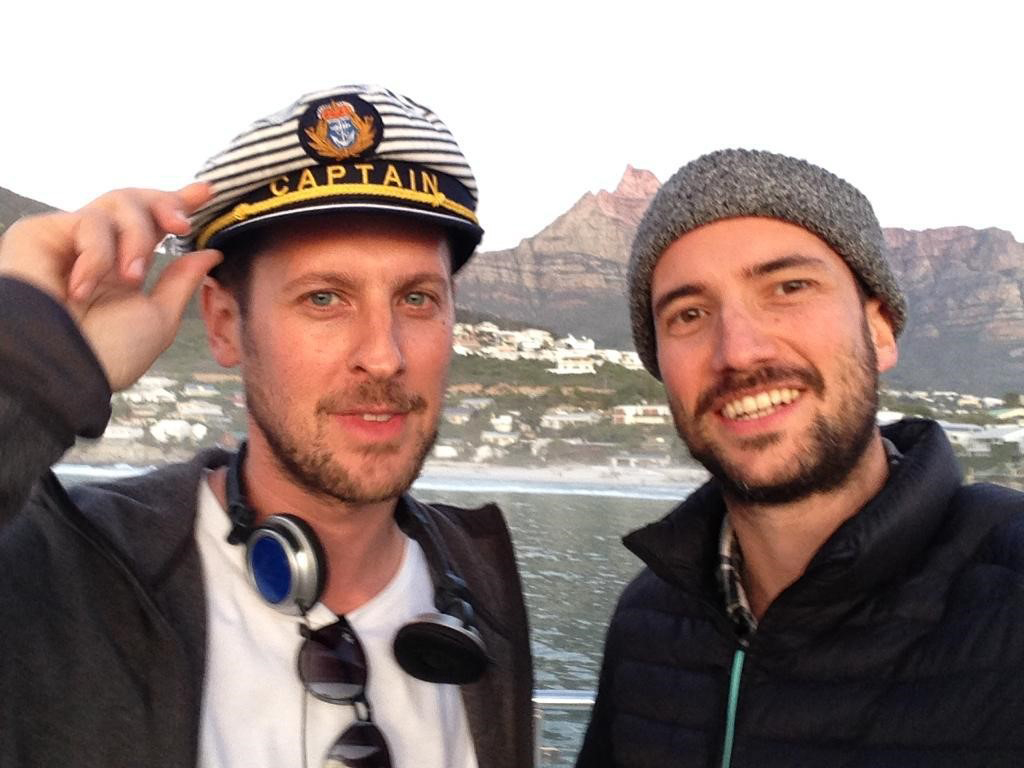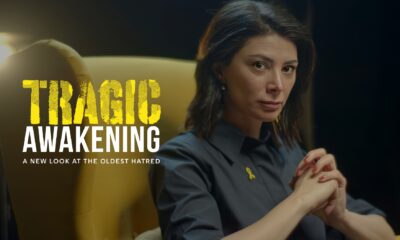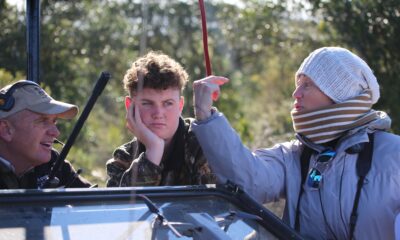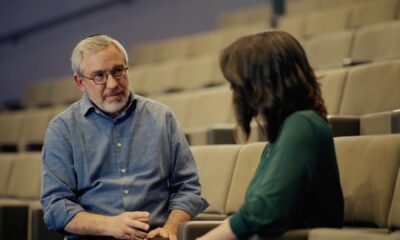
Lifestyle

The Shakedown brings lightness to Cape underworld
The Shakedown, a South African crime-comedy caper by Ari Kruger (AK) and Daniel Zimbler (DZ), will premiere on Prime Video on 8 August. The SA Jewish Report spoke to Zimbler, who co-wrote it with Kruger, the movie’s director.
What inspired you to write/produce The Shakedown?
AK: I’ve always found our criminal underworld in South Africa intriguing in that it’s filled with colourful characters, clumsiness, and absurd stories of hits gone wrong. I felt like I hadn’t seen a film that explored the danger of our underworld in a comic way.
Having grown up in the Jewish community in Cape Town, I’ve witnessed how this underworld is one degree of separation away. Whether it be through a black-sheep sibling or an old friend from school, these worlds have the ability to collide at a moment’s notice. I thought it would be fun to have our protagonist be a clean-cut pillar of the community who lands up getting pulled into the danger and comedy of this underworld.
When you began the process, what were you hoping to achieve?
AK: My intention was to make something entertaining, funny, and filled with a lot of heart. I also haven’t seen enough local films made within a crime-comedy genre, and I felt there was an opportunity to offer South African audiences something fresh, and hopefully transcend this specific comic tone to a global stage.
How would you describe The Shakedown?
DZ: It’s a crime-comedy caper. It’s also an inverted morality tale about brotherhood and family: a Fresnaye golden boy takes his blessings and his family for granted, and suffers an excruciating and embarrassing fall from grace. But in the process, he recovers his relationship with his black-sheep brother and his family. And so his hubris, which leads to his fall, also leads to his redemption. In the end, after a pretty hellish ordeal, our protagonist gets his priorities straight and rediscovers the relationships that really matter.
This is the first South African-original film that will go out on Amazon Prime Video. How did that come about?
AK: We were lucky to get in quite early with the Amazon team as it was familiar with our work on the Tali series that we made for Showmax. It really was an incredible experience working with it. The team was supportive and encouraging throughout the process.
We didn’t necessarily feel any kind of pressure about it being its first commission, we just focused on trying to make the best version of this film that we could make.
DZ: In terms of it being an Amazon first, it’s been really exciting. My hope is it will be the first of many, and that the appetite for South African TV shows and films keeps growing locally and internationally.
Why do you believe it was accepted on the platform, especially because it’s supposedly scaling down on content from Africa?
AK: I can’t speak too much on this, but from what I can tell, Amazon was in the process of commissioning several local projects but due to its global restructure, it decided to push pause on the commissions.
While getting onto Amazon Prime is a first, are there any other firsts in this for you?
AK: This is my first feature film, which was always a huge dream of mine. I’ve been fortunate to have made three seasons of television, short films, and comedy specials, but as a filmmaker, the feature film is the holy grail. It was also my first time having a director’s chair with my name on the back!
DZ: I’ve spent a lot of the past 10 years writing and directing on TV series. But it wasn’t TV that first made me want to be a filmmaker, it was film. And so, writing a movie feels like returning to the source.
What are you trying to say in a movie about a guy who has it all having an affair and getting mixed up in the underworld because of his mistress’s threats?
AK: My work has always in some way reflected the stage of life I’m in. When we started writing this film, I was in the early throes of starting a new family while at the same time building my career. This film explores the conflict that we may feel in sacrificing our careers for our family, and tries to discover what really matters.
DZ: Like Justin Diamond, we’re all capable of making terrible mistakes and finding ourselves cornered by those mistakes. But, and here I hope we’re striking a hopeful, even uplifting note – which has nothing to do with the hiring of hit men, betting on horses, extortion, intimidation, and attempted murder – redemption is possible. If we can step back and figure out the things that really matter, we can survive the dark night and make it to the dawn.
What were your best and worst moments in making The Shakedown?
AK: It was a huge privilege to get to make this film on a large scale with a world-class crew, cast, and post-production team who were all on the top of their game. We also had a bigger budget than we had been used to working with, so generally it was such a positive and exciting experience.
The worst moments were dodging the winter rain in Cape Town. We quite literally shot through the storm, and it meant sometimes losing precious shooting time in the day while waiting for the skies to clear.
What made you decide that he should be Jewish? What does that add to it?
AK: I grew up in a Jewish world, and no matter what, the Jewish aspect seems always to find its way into my work. We had also experienced a lot of surprisingly positive feedback through our Tali series about the Jewish nature of the show. I felt like there was more to explore in the Jewish world, but within the crime-comedy genre.
How does Tali Babes compare?
DZ: It’s a different story and a different genre, but the intention is the same: that the audience should laugh, have fun, and be entertained. As a feature film, it was an opportunity to write a story with a clear, complete arc for our characters, without thinking about a next season or whether to hold back in order to give the characters a longer, multi-season arc. That was quite freeing, challenging, and a lot of fun.
How does South African content generally do in an international market like that of Amazon Prime?
AK: There seems to be a global interest in South African content at the moment, which is really positive. There certainly have been some recent South African hits making waves overseas. Spinners, which Daniel was a writer on, is a local show about spinning culture in the Cape Flats, and it’s performing well in France.
DZ: Added to that, with the arrival of the streamers, in particular Netflix, local shows are getting real exposure to international audiences for the first time. Blood and Water, Fatal Seduction, Unseen, Heart of the Hunter, these are all shows and movies made for local audiences that are hitting it out of the park when it comes to international streaming numbers, making Netflix’s top-10 globally in some cases. So it’s an exciting time to be making South African work, and no doubt the best of it will rise and be seen on the international stage.
The humour, much like with Tali, has a very Jewish flavour, but do others resonate with it like we do? If so, why?
DZ: Given that Curb Your Enthusiasm was one elaborate Jewish joke from start to finish and it lasted 12 seasons, we know for certain that Jewish humour can resonate with everyone. Humour is pretty hard to pin down and takes many forms, and the success of a joke is notoriously difficult to predict. But in most cases – not all, but most – where we have found something really funny in the writing, others find it funny too. And that seems to cut across cultures and borders.
How did you select your cast, particularly your stars?
AK: I had some ideas about which actors I wanted to play some of the characters. In some cases, I gave the role to some of these actors, but we also had to do quite extensive casting. It’s always the most difficult part of the process for me as it can make or break your show. In this case, we had a great team led by Bonnie Lee Bouman who cast the net wide for our characters. The big one was bringing down Carl Beukes from Los Angeles, but luckily Amazon bought into him playing our lead and supported the decision to bring him down here.
What’s next for the two of you?
DZ: We plan to exhaust every Jewish South African stereotype we can find.
In addition, we’re developing a couple of new comedy series together. And coming up in 2025, a really exciting series for Netflix that I’ve written and Ari will direct.










